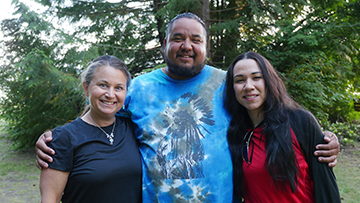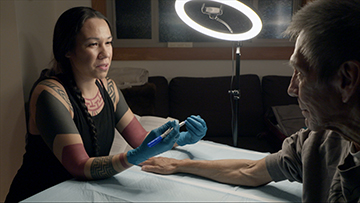By Odette Auger
A Buffalo Spirit Report, Windspeaker.com
Three Indigenous media makers gathered to listen and learn from their Elders, documenting the teachings in the film s-yéwyáw / Awaken.
The premiere is set for Oct. 13 at 7 p.m. at the Paradise Theatre in Toronto. The film is part of the Planet In Focus International Environmental Film Festival running Oct. 12 to Oct. 22. See the website here: https://planetinfocus.org/
Along with preserving and communicating teachings, the media makers share their own stories of transformative learning through cultural teachings.
“There's a story of healing here, of parents, filmmakers, creators, humans that are really trying to model what's possible and doing so while walking with the guidance of their Elders,” says s-yéwyáw / Awaken co-creator Charlene SanJenko.

“I really believe that we're in a time of the return to the sacred art of storytelling,” says SanJenko. She’s Splatsin of the Secwépemc Nation (Shuswap, B.C.), and her own story is one of reconnecting to her community. A child taken in the Sixties Scoop, SanJenko grew up knowing she was adopted away from her community as a baby.
As a child of five or six years old, SanJenko said she would get up earlier than her adopted parents every morning to draw and colour.
“I would create every morning. Visual creative expression is something that I've always been drawn to and connected to almost more so than the use of words through the English language,” says SanJenko.
“And I could never quite put two and two together until, over the last few years, really recognizing that English isn't my native tongue. It is something I was taught.” That’s why she first expressed herself through pictures and colours, she says.
For SanJenko, the words “creativity” and “spirituality” are interchangeable.
“Creativity is a safe word in our modern era, but really to me, creativity, absolutely, means our reconnection point to spirit.”
SanJenko says that as cultural stories are told, it’s important to reclaim the role that storytellers have had in the past.
“Storytellers really have guided culture, guided communities, shared teachings, and actually helped to formulate how a community acts with each other.”
“We lost that somehow in storytelling. And I think we're returning to it now.”
“For the last hundred years storytelling has really gone towards entertainment only at all costs. And now we're craving the sacred art of storytelling as a tool for re-establishing hope, reclaiming what we've lost and connection to each other,” says SanJenko.
“If you are living in this generation, you are part of that return,” says SanJenko.
This project found SanJenko at a time in her own journey where her teacher, mentor and friend, Chief Wenecwtsin, Wayne Christian (Secwepemc), who is in the film, said something that guides all of her work now.
“He said ‘we can absolutely heal ourselves and our families in three generations if we hold it a sacred priority,’” says SanJenko.
“I don't think he meant for me to take it as a challenge, but in a way, I did,” SanJenko says. “If that is true, then what's my role in that, if I'm alive right now?”
In the film, Wenecwtsin speaks of also belonging to the Sixties Scoop era, and his motivation.
“We're trying to find a way to reach out literally to the thousands of our people that have been through that process that are struggling,” he says. “The children have called us forward to do this work.”
In another conversation with SanJenko, Wenecwtsin says humanity only went off course in the last 100 years. He says “we've lost our way. We've gone off our trajectory, and it's up to us now to get us back on course,” SanJenko says.
“Elders that are among us are the closest thing that we have to who we were before we went off course,” SanJenk said. “And so gathering their knowledge, their wisdom, is part of that remembering that is going to help bring us back on course.”

Continuing the theme of intergenerational healing in s-yéwyáw / Awaken is Ecko Aleck of shíshálh Nation (B.C.) with the story of her own commitment to walking with cultural teachings.
In one scene of the film, she is tattooing her father Terry Coyote Aleck. He shares his story of putting all of his energy into bringing Indian residential school abusers to account. Ecko speaks of his impact on how she had grown up.
SanJenko says she’s “witnessing this young mother raising two small boys and courageously prioritizing, over anything else, that she is not passing along any trauma to her children.”
Alfonso Salinas, also of the shíshálh Nation, is an artist, filmmaker and traditional wellness coordinator. Salinas’ passion is for keeping culture alive.
Salinas said it’s not easy balancing his roles of artist and cultural leader.
“Honestly, it's very difficult to do both. It is hard to participate in spirituality and culture, as some protocol is not to have it on film,” he says. He was committed to carefully share what was appropriate in s-yéwyáw / Awaken, he says.
Salinas says the most important thing in the film process was involving Elders sharing their stories, particularly about the impacts of residential schools. He has many mentors and teachers to thank, and two of them appear in s-yéwyáw / Awaken.
In the documentary, hiwus (Chief) Calvin Craigan reflects on the trauma Indigenous people have experienced and the need for healing in their communities. While visiting original shíshálh village sites and territory, he says, “There were more than 30,000-40,000 of our people spread throughout all of those lands.”
Salinas explains, “We had a way of life where we were able to thrive.” After contact, that number dropped to 160.
“We are descendants of that time of disease,” says Salinas. Rising “to being a strong 1,500. Now we are actually descendants of these people who survived” the dark times, which included residential schools.
“But we're still here. And all of that was supposed to destroy our identity, so our responsibility is to keep it alive. That means our language, traditions, culture, stories, families, land, and way of life.”
SanJenko says projects like s-yéwyáw / Awaken “can uplift and shift our future's narrative.”
(Main photo caption: Alfonso Salinas,(shíshálh Nation) artist, filmmaker, and traditional wellness coordinator. Photo still from s-yéwyáw / Awaken.)
Windspeaker is owned and operated by the Aboriginal Multi-Media Society of Alberta, an independent, not-for-profit communications organization.
Each year, Windspeaker.com publishes hundreds of free articles focused on Indigenous peoples, their issues and concerns, and the work they are undertaking to build a better future.
If you support objective, mature and balanced coverage of news relevant to Indigenous peoples, please consider supporting our work. Whatever the amount, it helps keep us going.
